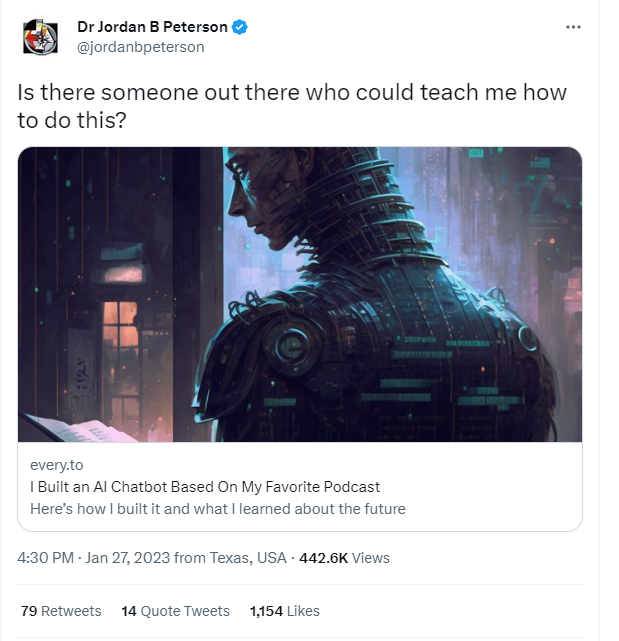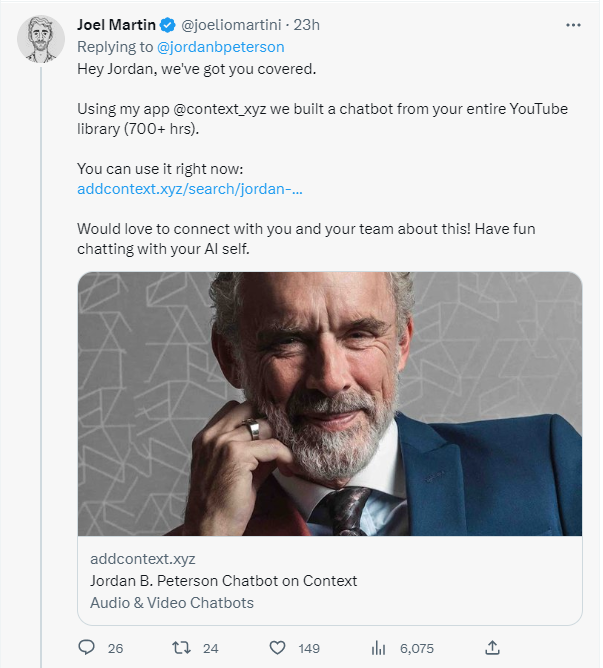As I see the deluge of posts about ChatGPT — mostly humorous queries and B+ grade AI blog posts — I can’t help but feel that most professionals, even those who are typically early adopters, are already being outpaced by the changes in GPT since December.
Unlike other major software developments of the past that are updated incrementally and centrally (i.e. operating systems, video editing software, office software), ChatGPT is spawning — at a daily and even hourly rate — hundreds of new startups leveraging the technology to transform entire disciplines.
Take for example, a recent tweet by Jordan Peterson, psychologist, professor, author, YouTube personality and podcast host, requesting info on how to create a chatbot based on a podcast:

The response, just minutes later:

That’s right. The technology to instantly create AI-powered chatbots already exists, and the company, Context, is ingesting thousands of hours of content every couple of hours, creating publicly accessible online ghosts of the most popular personalities on the internet.
It’s moving fast. A hell of a lot faster than, “GPT3 can write poems” or “What a great SEO article it generated!”
As an event professional and one who is heavily invested in how digital technologies drive attendance and experience, I'm deeply interested in how AI like ChatGPT will transform the way event businesses work.
Here are three of the areas that I think will begin to disrupt or transform the trade show/large-scale events space using generative AI plus live internet data.
1. Customer Service
Combine your event FAQs, documentation, web information and live local internet information into an always-on customer service bot that can answer the hardest questions faster than a human. Quickchat AI is on this with its new Intercom integration. These bots will be able to upsell customers by conversing or even inferring needs — perhaps based on live customer data housed on social media platforms. Once combined with generative AI video services like Synesthesia, AI transforms human-to-human customer service.
2. Topline Event Strategy, the C Suite
In case you thought the C suite was exempt from AI disruption...nope! AI will ingest all of your event's vendor contracts, financial performance records, marketing performance data, event strategy documents, website data, customer feedback and, combined with live internet data, present deeply nuanced event strategy plans that can be refined based on further context and human input. For instance, presenting multiple plans based on the risk appetite of the event organizer or projections based on the likelihood of economic headwinds in future years. Thus AI disrupts the C suite and event leadership.
3. Marketing Strategy and Execution
Similar to the above, AI ingests all marketing data — including visual assets — and creates marketing strategies with full marketing campaigns built out from the ground up. They can be selected at will and morphed and edited at any point in the campaign based on feedback from the event team. Or the AI can simply change the campaigns themselves based on live performance data. AI disrupts and utterly transforms marketing.
As of yet, ChatGPT use in the events industry is in its infancy and still very much misunderstood. Training will be critical for employees across departments and disciplines to understand that ChatGPT is not fundamentally a copywriting platform. It is an intelligence system capable of reasoning, combining multiple abstract concepts and creating unique and insightful takeaways for business leaders.
Don’t miss any event-related news: Sign up for our weekly e-newsletter HERE, listen to our latest podcast HERE and engage with us on Twitter, Facebook and LinkedIn!




